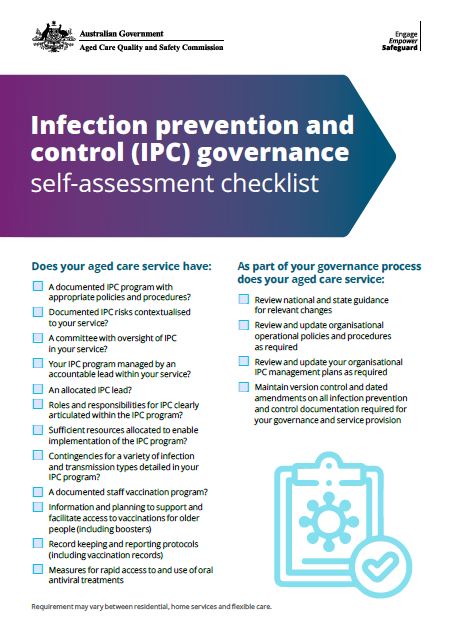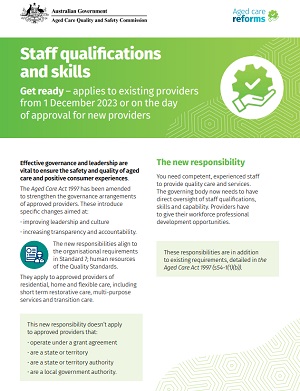Joint letter from the Commission and the Department of Health and Aged Care to approved providers on medication management.

This fact sheet is for people receiving aged care services and provides information on the Commission’s dedicated Food, Nutrition and Dining Hotline to receive questions, concerns and complaints about food, nutrition and dining in aged care.

This resource provides information about the Food, Nutrition, and Dining Hotline, which offers advice and addresses concerns regarding food and dining in aged care. It allows aged care providers, staff, residents, families, and carers to raise issues about nutrition, menu planning, and dining experiences to improve quality and care outcomes. This resource may refer to information that will be updated from 1 July 2025 to align with the new Aged Care Act and Quality Standards.

The Aged Care Quality and Safety Commission (the Commission) undertakes a range of regulatory activities to monitor compliance and mitigate risk to aged care consumers. The Commission has incorporated spot check monitoring of infection control practice into its usual regulatory activities. You can find more information about Infection control spot checks here.

As a volunteer you are part of the aged care workforce and play a key part in supporting older Australians.

Joint letter from the Aged Care Quality and Safety Commissioner, Janet Anderson PSM and Professor Paul Kelly, Chief Medical Officer to all approved providers of residential aged care services on uptake of the COVID-19 booster.

Letter from Ann Wunsch, Executive Director – Approvals and Serious Incident Notifications, regarding information about your SIRS responsibilities and reporting obligations.

This fact sheet for approved providers outlines the key changes on workforce-related responsibilities from 1 July 2023 regarding 24/7 registered nurse coverage and care minutes in residential aged care.

This fact sheet outlines your right to make choices about your food and drink. This includes how your care team can support you to make an informed choice about food or drink that may be a risk to your health.

A poster for providers to use in their service to encourage consumers to get involved in the consumer advisory body.

A fact sheet for consumers that details a provider’s responsibility to offer to establish a consumer advisory, the purpose of the consumer advisory body and how to get involved.

A fact sheet that introduces the responsibility for providers to establish and continue a quality care advisory body.

A fact sheet that details the responsibility to ensure staff have appropriate skills, qualifications, experience and professional development opportunities.

A fact sheet that explains the responsibility for providers that are wholly-owned subsidiaries to ensure their constitution prioritises the consumer over the holding company.

A fact sheet that introduces the responsibility for providers to offer to establish and maintain a consumer advisory body.

Pilot audit of the draft strengthened Quality Standards.

National Aged Care Provider Conference 2023. Keynote plenary address by the Commissioner - Regulating to propel positive change (Looking under the bonnet of the ACQSC).

National Aged Care Provider Conference 2023 - Stronger Standards, Better Aged Care Program. Presentation by Lisa Peterson PSM Assistant Commissioner, Sector Capability.

National Aged Care Provider Conference 2023 - Office of the Interim Inspector-General of Aged Care. Presentation by Ian Yates AM, Interim Inspector-General of Aged Care.

National Aged Care Provider Conference 2023 - Our approach to resolving complaints. Presentation by:
- Janet Anderson PSM, Commissioner
- Louise Macleod, Complaints Commissioner
- Michelle Bampton, Executive Director, Intake and Complaints Resolution








